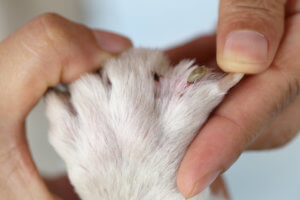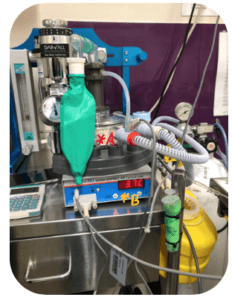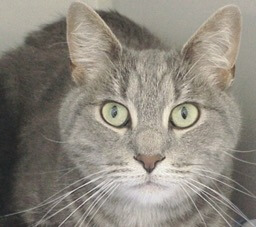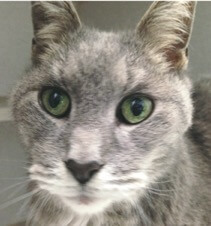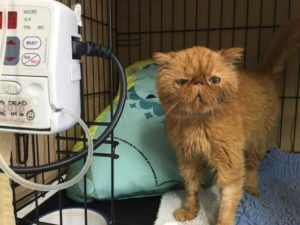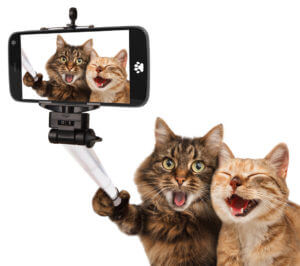My cat is missing
We have put together a guide to help owners with lost cats. Whilst it is not a guaranteed way to find your missing cat, we have found that a lot of these tips have had some success.
A lost cat is one of the most heartbreaking things a pet owner can experience. Unfortunately having an outdoor cat will always carry the risk of kitty not returning home and going missing regardless of what precautions you take (a safety-release collar with your phone number is aways a good idea to have on an outdoor cat).
Having a completely indoor cat does not also guarantee that your cat may never go missing – indoor cats are still prone to running out of an open window or door! For most cases, particularly for indoor cats, the missing cat is hiding somewhere very close to home so it is a good idea to regularly do a scan of your immediate area (look under nooks and crannies and other small places where your cat may have become trapped)
Tips to help find your cat:
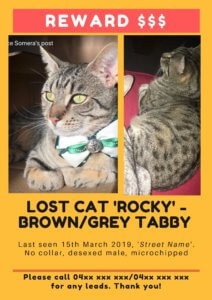
An example of a ‘Missing Flyer’ used by one of our staff members who was luckily enough to have been reunited with her missing cat after more than a month!
These tips are based on real success stories (the sooner you are able to carry out the suggestions the higher your chance of finding your cat).
- Set up a litter tray with some used litter from your cat around the entry points of your home.
- Set up a food bowl with your cat’s favourite treats (preferably ones with a strong scent such as roast chicken or sardines) around your home.
- Rent a humane cat trapper from your local vet or purchase one from Bunnings. Set up the trapper near your home and cover it with your cat’s towel/blanket and bait it your cat’s favourite food (again try to use foods with strong scents). It is important you check the trapper at least twice a day to ensure you don’t accidentally catch someone else’s cat! And also to change the food regularly.
- Print as many Missing flyers as you can and drop them in your neighbours’ mailboxes (try to cover as many houses as possible, a block is a good minimum)
- Put up as many Missing Flyers as you can on telephone poles (again around your block is a good minimum). You may find some people tearing them down, it is important to keep putting them up again to gain as much visible coverage as possible.
- Post about your missing cat on as many Facebook Lost Pet Groups as possible.
- Go out late in the night when it is most quiet with roast chicken and call out for your cat.
- Call your usual vet and notify them of your lost cat, ask them to change your cat’s microchip status from ‘home’ to ‘missing’.
- Call all your local vets to notify them of your lost cat and provide them with a detailed description as well as your contact details.
- Contact your local pounds to notify them of your lost cat in case it has been impounded (which is usually the case if not chipped)

There are cases of people being reunited with pets that have been missing for more than a year!
Whilst it is easy to lose hope of ever seeing your cat again it is important to remember to not give up. Our own staff member Beatrice had found her lost cat after more than a month of searching, she followed all of the points we have provided and her eventual success was the result of a letter box drop.
We also post ‘Missing Cat’ posters on our clinic window and on our Facebook page so please feel free to email us your flyers if your cat is missing.
Once you do find your cat make sure you book a visit to your usual vet ASAP for a general heath check.

